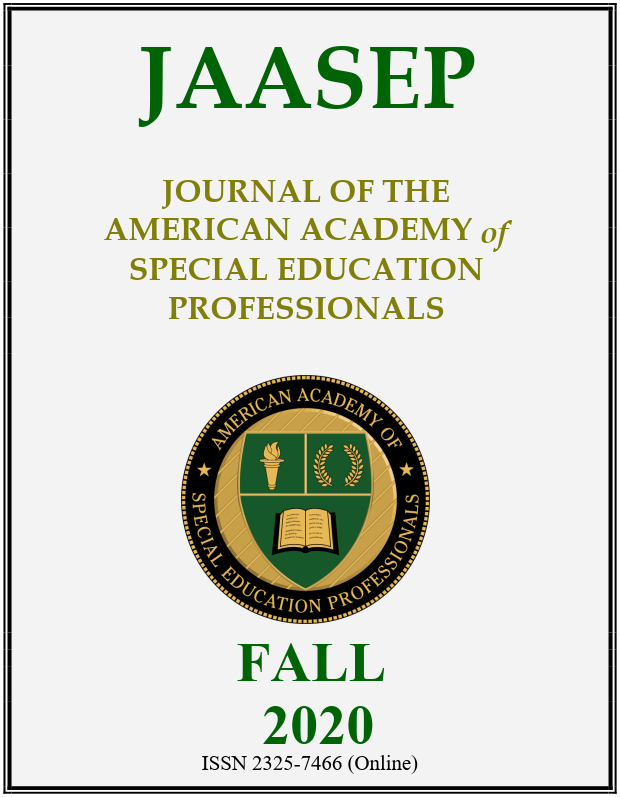Progress in Education for Students with Intellectual Disabilities in Saudi Arabia: Evaluating Status
Abenavoli, R. M., Jennings, P. A., Greenberg, M. T., Harris, A. R., & Katz, D. A. (2013). The protective effects of mindfulness against burnout among educators. The Psychology of Education Review, 37(2), 57-69. DOI: https://doi.org/10.53841/bpsper.2013.37.2.57
Alahari, U. (2017). Supporting socio-emotional competence and psychological well-being through mindfulness practice. Contemporary School Psychology, https://doi.org/10.1007/s40688-017-0154-x DOI: https://doi.org/10.1007/s40688-017-0154-x
Brown, K. W., & Ryan, R. M. (2003). The benefits of being present: Mindfulness and its role in psychological well-being. Journal of Personality and Social Psychology,84(4), 822-848. doi:10.1037/0022-3514.84.4.822 DOI: https://doi.org/10.1037/0022-3514.84.4.822
Brunsting, N. C., Sreckovic, M. A., & Lane, K. L. (2014). Special education teacher burnout: A synthesis of research from 1979 to 2013. Education & Treatment of Children, 37(4), 681-711. Retrieved from http://search.proquest.com.librda.mville.edu:2048/docview/1625463807?accountid=12257 DOI: https://doi.org/10.1353/etc.2014.0032
Carter, C., PhD. (2015). The sweet spot: How to find your groove at home and work. New York: Ballantine Books.
Cavanagh, K., Strauss, C., Forder, L., & Jones, F. (2014). Can mindfulness and acceptance be learnt by self-help? A systematic review and meta-analysis of mindfulness and acceptance-based self-help interventions. Clinical Psychology Review, 34(2), 118-129. doi:10.1016/j.cpr.2014.01.001 DOI: https://doi.org/10.1016/j.cpr.2014.01.001
Creswell, J. D. (2017). Mindfulness interventions. Annual review of psychology, 68, 491-516. https://doi.org/10.1146/annurev-psych-042716-051139 DOI: https://doi.org/10.1146/annurev-psych-042716-051139
Emerson, LM., Leyland, A., Hudson, K. et al. Mindfulness (2017) 8: 1136. https://doi.org/10.1007/s12671-017-0691-4 DOI: https://doi.org/10.1007/s12671-017-0691-4
Feistritzer, C. (2011). PROFILE OF TEACHERS IN THE U.S.2011. National Center for Education Information.
Fives, H., Hamman, D., & Olivarez, A. (2007). Does burnout begin with student-teaching? Analyzing efficacy, burnout, and support during the student-teaching semester. Teaching and Teacher Education, 23(6), 916-934. doi:10.1016/j.tate.2006.03.013 Flaxman, G., & Flook, L. (n.d.). Brief Summary of Mindfulness Research. 1-8. Retrieved September 19, 2018, from http://marc.ucla.edu/workfiles/pdfs/marc-mindfulness-research-summary.pdf DOI: https://doi.org/10.1016/j.tate.2006.03.013
Flook, L., Goldberg, S. B., Pinger, L., Bonus, K., & Davidson, R. J. (2013). Mindfulness for teachers: A pilot study to assess effects on stress, burnout, and teaching efficacy. Mind, Brain, and Education, 7(3), 182-195. doi:10.1111/mbe.12026 DOI: https://doi.org/10.1111/mbe.12026
Garwood, J. D., PhD., Werts, M. G., PhD., Varghese, C., PhD., & Gosey, L., M.A. (2018). Mixed-methods analysis of rural special educators' role stressors, behavior management, and burnout. Rural Special Education Quarterly, 37(1), 30-43. doi:http://dx.doi.org.librda.mville.edu:2048/10.1177/8756870517745270 DOI: https://doi.org/10.1177/8756870517745270
Goldberg, S., Tucker, R. P., Greene, P. A., Simpson, T. L., Kearney, D., & Davidson, R. J. (2017). Is mindfulness research methodology improving over time? A systematic review. PLoS One, 12(10). doi:10.31231/osf.io/nm7a8 DOI: https://doi.org/10.1371/journal.pone.0187298
Goyal, M., Singh, S., Sibinga, E., Gould, N., Rowland-Seymour, A., Sharma, R., . . . Cramer, H. (2014). Meditation Programs for Psychological Stress and Well-being: A Systematic Review and Meta-analysis. JAMA Intern Med., 174(3), 357-368. doi:10.1001/jamainternmed.2013.13018 DOI: https://doi.org/10.1001/jamainternmed.2013.13018
Harker, R., Pidgeon, A. M., Klaassen, F., & King, S. (2016). Exploring resilience and mindfulness as preventative factors for psychological distress burnout and secondary traumatic stress among human service professionals. Work, 54(3), 631. Retrieved from http://search.proquest.com.librda.mville.edu:2048/docview/1809053287?accountid=12257 DOI: https://doi.org/10.3233/WOR-162311
Hartigan, B. F. (2017). Mindfulness in Teacher Education: A Constructivist Approach to Stress Reduction for Teacher Candidates and Their Students. Childhood Education, 93(2), 153-158. doi:10.1080/00094056.2017.1300494 DOI: https://doi.org/10.1080/00094056.2017.1300494
Hassed, C., & Chambers, R. (2014). Mindful learning: Reduce stress and improve brain performance for effective learning. Wollombi, NSW: Exisle Publishing.
Jennings, P. A., Frank, J. L., Snowberg, K. E., Coccia, M. A., & Greenberg, M. T. (2013). Improving classroom learning environments by Cultivating Awareness and Resilience in Education (CARE): Results of a randomized controlled trial. School Psychology Quarterly, 28(4), 374-390. doi:10.1037/spq0000035 DOI: https://doi.org/10.1037/spq0000035
Kabat-Zinn, J. (1990). Full catastrophe living: Using the wisdom of your body and mind to face stress, pain, and illness. New York, NY, USA: Delta Trade Paperbacks.
Kolbe, L.J., & Tirozzi, G.N. (2011). School employee wellness: A guide for protecting the assets of our nation’s schools. Atlanta, GA: Centers for Disease Control.
Lopez, P. G. (2017). Self-care: The missing link in best practice-part II. Bethesda: National Association of School Psychologists. Retrieved from http://search.proquest.com.librda.mville.edu:2048/docview/1862879382?accountid=12257
Lutz, J., Herwig, U., Opialla, S., Hittmeyer, A., Jäncke, L., Rufer, M., . . . Brühl, A. B. (2013). Mindfulness and emotion regulation—an fMRI study. Social Cognitive and Affective Neuroscience,9(6), 776-785. doi:10.1093/scan/nst043 DOI: https://doi.org/10.1093/scan/nst043
Rechtschaffen, D. (2014). The way of mindful education: Cultivating well-being in teachers and students. New York: W.W. Norton & Company.
Reed, S. (2016). Teacher burnout: Special education teachers' perspectives (Order No. 10251714). Available from ProQuest Central; ProQuest Dissertations & Theses Global. (1870784411). Retrieved from http://search.proquest.com.librda.mville.edu:2048/docview/1870784411?accountid=12257
Roeser, R. W., Schonert-Reichl, K. A., Jha, A., Cullen, M., Wallace, L., Wilensky, R., . . Harrison, J., (2013). Mindfulness training and reductions in teacher stress and burnout: Results from two randomized, waitlist-control field trials, Journal of Educational Psychology, 105, 787-804, doi:10.1037/a0032093 DOI: https://doi.org/10.1037/a0032093
Roeser, R. W., Skinner, E., Beers, J., & Jennings, P. A. (2012). Mindfulness Training and Teachers Professional Development: An Emerging Area of Research and Practice. Child Development Perspectives, 6(2), 167-173. doi:10.1111/j.1750-8606.2012.00238.x DOI: https://doi.org/10.1111/j.1750-8606.2012.00238.x
Sharp Rodriquez, J. A. (2015). Mindful instructional leadership: The connection between principal mindfulness and school practices (Order No. 3717473). Available from ProQuest Central; ProQuest Dissertations & Theses Global. (1703466486). Retrieved from http://search.proquest.com.librda.mville.edu:2048/docview/1703466486?accountid=12257
Sneyers, E., Jacobs, K., & Struyf, E. (2016). Impact of an in-service training in neurocognitive insights on teacher stress, teacher professionalism and teacher student relationships. European Journal of Teacher Education, 39(2), 253-266. doi:10.1080/02619768.2015.1121985 DOI: https://doi.org/10.1080/02619768.2015.1121985
Tarrasch, R. (2015). Mindfulness meditation training for graduate students in educational counseling and special education: A qualitative analysis. Journal of Child and Family Studies, 24(5), 1322-1333. doi:http://dx.doi.org.librda.mville.edu:2048/10.1007/s10826-014-9939-y DOI: https://doi.org/10.1007/s10826-014-9939-y
Thomas, K. (2015). Mindful teaching: A narrative exploration of mindfulness and livelihood through the eyes of teachers (Order No. 3714245). Available from ProQuest Central; ProQuest Dissertations & Theses Global. (1708672432). Retrieved from http://search.proquest.com.librda.mville.edu:2048/docview/1708672432?accountid=1225
Van Dam, N. T., van Vugt, M. K., Vago, D. R., Schmalzl, L., Saron, C. D., Olendzki, A., et al. (2017). Mind the hype: a critical evaluation and prescriptive agenda for research on mindfulness and meditation. Perspectives on Psychological Science. Advance online publication. https://doi.org/10.1177/1745691617709589 DOI: https://doi.org/10.1177/1745691617709589
